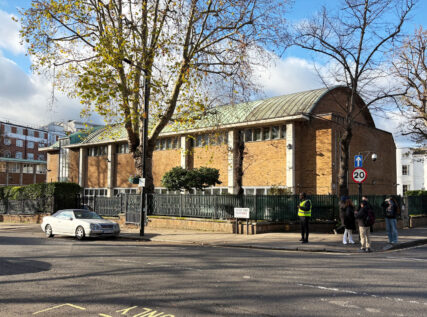LONDON (RNS) — First came the protest outside the Park East Synagogue in New York as it hosted an event promoting immigration to Israel.
Then on Sunday (Nov. 23), anti-Zionist protesters rallied outside St. John’s Wood Synagogue in London, for also holding an event encouraging immigration of Jews to Israel.
The protests were roundly denounced by mainstream Jewish communities on both sides of the Atlantic, prompting condemnation and widespread allegations of antisemitism and concern about Jewish safety. The protests also suggest that public fury over Israel’s devastating war in Gaza, and escalating settler violence against Palestinians in the West Bank, is far from over despite a ceasefire declared last month. Deep divisions over Israel’s conduct have become entrenched, causing fissures between Jews, Muslims and Christians and also among Jews themselves.
In the New York protest, a rowdy crowd outside the prominent Orthodox synagogue shouted “death to the IDF,” “globalize the intifada” and “We don’t want no Zionists here.”
The protest prompted New York Police Department Commissioner Jessica Tisch, who is Jewish, to apologize to Park East Synagogue members at Shabbat service for not providing adequate access to and from the synagogue for those Jews wanting to attend the event.
The event that prompted the protest was a gathering sponsored by Nefesh B’Nefesh, an organization that promotes Jewish immigration to Israel but also to dozens of settlements in the occupied West Bank.
Mayor-elect Zohran Mamdani condemned the protesters’ rhetoric but also said “sacred spaces” should not be used to promote activities in violation of international law, rattling many Jews who fear he will not protect those who champion Israel.
For many Jews, the nature of the demonstration crossed a line.
“When protesters yell obscenities at Jews and when they call for violence and use rhetoric that is violent in front of a Jewish institution, I think that’s not only wrong, it’s antisemitic,” said Jonathan Jacoby, president and national director of the Nexus Project, a U.S. nonprofit dedicated to combating antisemitism.
RELATED: What Mamdani missed about the Manhattan synagogue protest
In London, the synagogue protest came in response to a similar event — an information fair providing advice and guidance to Jewish people considering immigrating to Israel. Protesters, in this case several anti-Zionist Jewish groups and one non-Jewish group called the Palestinian Pulse, gathered on Sunday outside the synagogue in a tony London neighborhood and attempted to hold an evening prayer outdoors. They unfurled a banner reading “Don’t Buy Zionist Propaganda: Anti-Israel is NOT Antisemitism.”
“The synagogue was hosting this event, which was actively encouraging British Jews to go and participate in the colonial occupation of Palestine, a lot of the time in illegal settlements,” said Talia Woodin, 26, a member of the group Jewish Anti-Zionist Action. “We couldn’t stand by while this event was happening in our community, or anywhere else, not least a place of worship, and so we had to protest it as Jews.”
Jews who had heard of the protest ahead of time positioned themselves at the exit outside the London Underground station, about 500 feet away, and tried to prevent the demonstrators from heading to the synagogue, accosting some. Some of those attempting to block the demonstrators were part of a group called Stop the Hate, a nonprofit whose goal is to fight antisemitism and to advocate for Israel.
London has seen numerous pro-Palestinian protests over the past year — though rarely in front of synagogues. The protests have drawn loud and angry complaints from British Jews, who say the demonstrations endanger their lives.
“It is obnoxious with a strong whiff of antisemitism to demonstrate outside a synagogue,” said Andrew Gilbert, vice president of the Board of Deputies of British Jews, an elected body representing most streams of Jewish life.
U.K. Prime Minister Keir Starmer said last month he wanted to grant police forces broader powers to restrict repeat protests. But it is not clear that such a bill is forthcoming.
A report issued last week found that Britons in both pro-Israel and pro-Palestinian camps are being pulled toward “more firm and unmovable views.”

St. John’s Wood Synagogue, a prominent Orthodox synagogue in London, was the site of a protest regarding an event promoting immigration to Israel on Nov. 23, 2025. RNS photo by Yonat Shimron
“They increasingly think worse of people on the opposing side, not just disagreeing with their arguments but questioning their motives and character. This makes it harder for them to speak to each other in good faith, and the temperature of the debate rises,” the report, titled “After Choosing Sides,” from More in Common, a public polling organization that conducts research on bridging divides.
St. John’s Wood Synagogue is one of the largest modern Orthodox congregations in London and, for years, the place where its chief rabbi attended.
The latest anti-Israel protests have prompted one rabbi in New York to suggest legislation barring demonstrations directly outside of houses of worship.
Others argue protesting outside of a synagogue — or any place of worship — should remain legal.
“I think a lot of those people would protest outside of a mosque if CAIR (the Council on American-Islamic Relations) was holding an event,” said Hadar Susskind, president and CEO of the New Jewish Narrative, a progressive Zionist group that pushes for peace and equality in Israel. “If the protest was done in a more appropriate manner, people would have been less inclined toward that response.”
RELATED: When it comes to Palestinian statehood, many British Jews recoil



